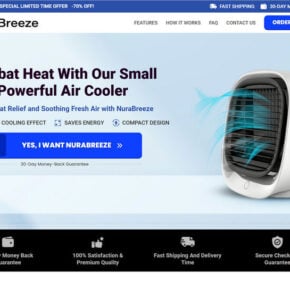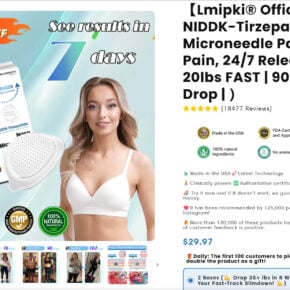Skin tags can be annoying and embarrassing, leading many people to search for quick DIY removal solutions. However, consumers need to beware – the demand for skin tag removers has also given rise to a flood of shady products, fake reviews, and deceptive sales tactics aimed at profiting off people’s insecurities. Read on to learn how to identify red flags and avoid falling victim to one of these all-too-common skin tag remover scams.
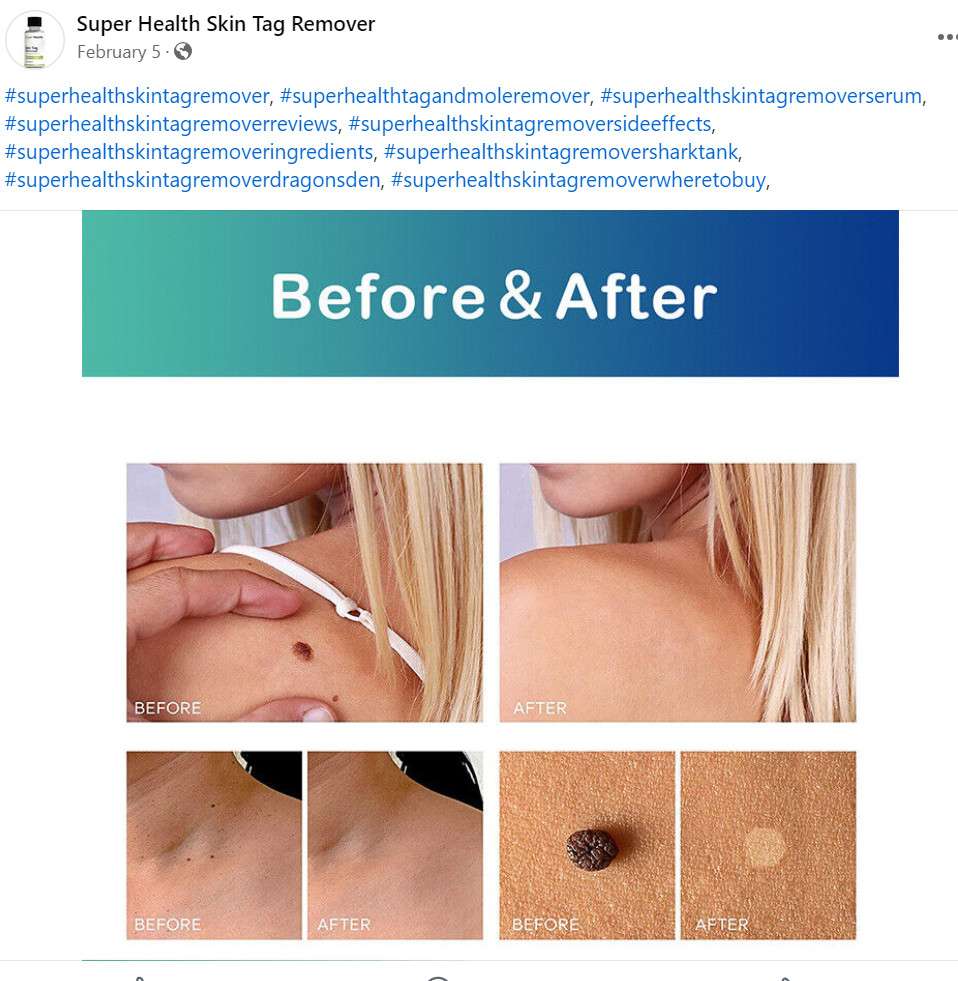
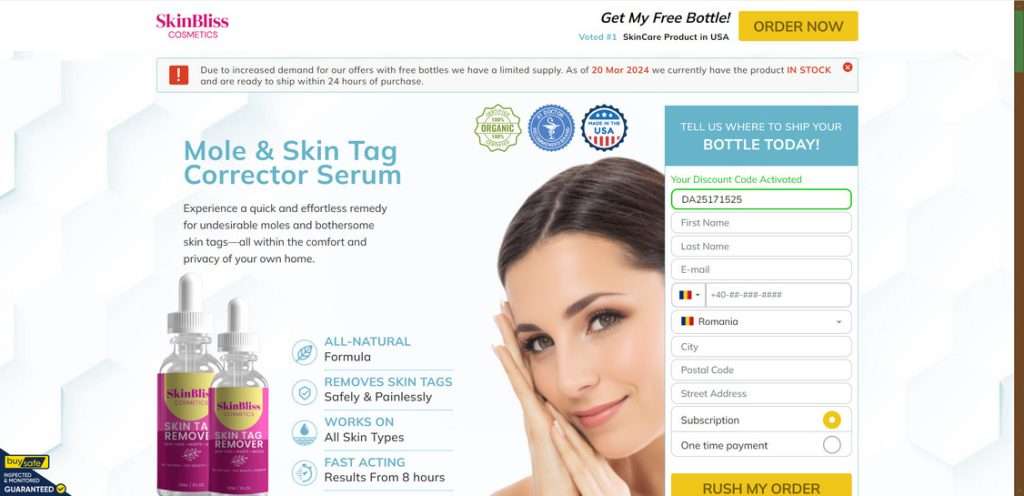
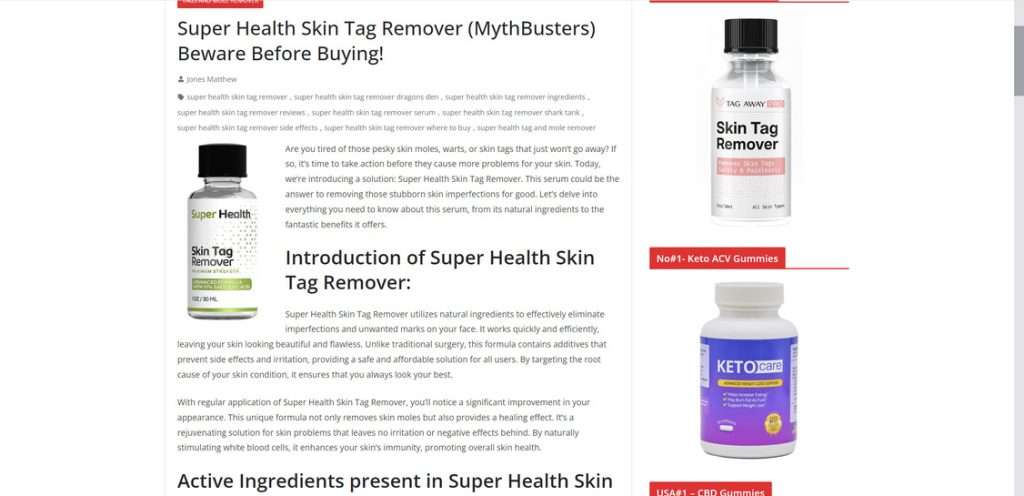
Overview of Skin Tag Remover Scams Bilking Consumers
Skin tags are extremely common, benign growths that appear on the skin, especially in folds around the neck, arms, eyelids, and groin. While harmless, their appearance can cause distress, leading many to seek ways to remove skin tags themselves quietly at home.
This demand has given rise to a cottage industry of skin tag removal products making bold claims about painlessly and rapidly eliminating skin tags. However, the vast majority rely on exaggerations and even outright fabrications to make sales.
Behind the convincing websites, emotionally-charged before and after photos, and enthusiastic reviews are usually products unable to live up to their lofty promises. Even worse, many ensnare customers into recurring monthly billing schemes that are nearly impossible to cancel.
How Widespread Are Skin Tag Remover Scams?
Skin tag remover scams have exploded along with the rise in affiliate marketing, where shady websites earn commissions promoting products of dubious quality. A quick Google search reveals pages and pages of skin tag removers with telltale signs of exaggerated marketing and deception.
The Federal Trade Commission received over 2,500 complaints about skin tag remover scams in 2023 alone, with victims reporting over $4.2 million in losses from deceptive free trials and hidden subscriptions. But these reported numbers likely only scratch the surface of how many have been duped.
Recurring Elements of Skin Tag Remover Scams
While specifics vary, skin tag remover scams tend to follow the same blueprint, including:
- Dramatic Before/After Photos: Showing skin tags vanishing within days, minimized pores, wrinkle reduction. Later found to be stolen stock images.
- Fake Reviews: Hundreds of 5-star reviews on the seller’s site praising amazing results. Nowhere else online reflects the same positive consensus.
- Celebrity Endorsements: Doctored videos and fake quotes making it seem like famous doctors or TV stars recommend the product.
- Exaggerated Claims: Promises the remover works rapidly, painlessly, safely. Claims of being “doctor-approved” and “FDA-registered” aim to legitimize.
- Subscription Traps: After a short free trial, people find themselves enrolled in expensive monthly shipments without consent. Cancelling is an arduous process.
- No Company Transparency: No business licenses, real offices or FDA registration can be verified. Owners remain anonymous to avoid accountability.
This consistent scam blueprint allows shady marketers to launch embellished skin products quickly under the radar to make fast cash, often hurting consumers in the process.
Costly Impacts of Skin Tag Remover Scams
It’s not just that these products fail to remove skin tags as advertised. The scams extract a much higher toll, including:
- Hundreds Lost to Hidden Fees: Fake trial terms enroll customers in expensive monthly shipments, billing hundreds before they can cancel.
- Ineffective Formulas: Products contain cheap fillers but lack proof any ingredients can actually eliminate skin tags long-term.
- Allergic Reactions: Ingredients are obfuscated, but may cause rashes or burns for some users.
- Delayed Proper Treatment: People waste time on scammy products when they could seek effective medical procedures from professionals.
- Emotional Distress: Victims feel shame, anger and depression about being manipulated when they needed legitimate help.
For those dealing with the stigma of skin conditions, falling victim to a scam remover product compounds their difficulties and vulnerability. More vigilance is urgently needed to protect consumers seeking real solutions from these deceptive marketers.
Why Skin Tag Scams Can Flourish Unchecked
So why do shady skin tag remover schemes continue proliferating despite outcry from consumer rights advocates? Several key factors enable their spread:
- Affiliate Marketing Model: Third-party websites earn commissions for promoting scammy products, spreading them rapidly.
- Low Barrier to Launch: Ecommerce platforms and marketing tools make it easy to create “legit”-looking sites to process orders.
- Minimal Health Regulations: Tags are cosmetic, so products make claims without oversight. The FDA only investigates a fraction of reports.
- Anonymity of Sellers: Owners conceal identities and locations to avoid legal accountability when products face backlash.
- Consumer Shame: Many feel embarrassed about skin tags and don’t report being scammed, letting companies continue operating.
Until changes emerge addressing these issues, buyers must vigilantly screen skin tag removers themselves to avoid being stung.
Skin tag remover scams have exploded into a minefield for consumers already struggling with skin conditions. Exaggerated marketing and billing tricks extract millions annually from unsuspecting victims desperate for discreet, affordable solutions.
If a skin tag remover seems suspiciously cheap, quick, or good to be true, proceed with the utmost caution. Verify company track records, examine purchases closely, and don’t hand over credit card details easily. A few prudent steps can help you avoid joining the countless buyers left used, confused and out hard-earned money after falling for one of these scams.
How Skin Tag Remover Scams Work to Deceive Consumers
Skin tag remover scammers use proven techniques to manipulate customers, appealing to emotions like shame and exploiting the desire for an easy fix. Here’s a step-by-step look at their sketchy playbook.
1. Hook You With Attention-Grabbing Ads
Successful scams start by catching your eye with dramatic, compelling advertisements. They appear as you browse social media, search online, or visit unrelated websites. Attention-grabbing images depicting ugly skin tags vanishing catch your notice. This plants the idea that a painless solution exists.
2. Build False Trust with Celebrity Endorsements
The ads often feature fake celebrity endorsements claiming famous doctors or TV personalities love the skin tag remover. More sophisticated scams use AI to create fake but convincing videos of celebrities like Ellen DeGeneres or Kelly Clarkson endorsing the product. This exploits the halo effect – cues of trustworthiness transfer from the celebrity to the product.

3. Make Exaggerated Claims About Results
Landing pages for the skin tag removers depict incredible before and after photos of skin tags disappearing completely in days. They claim their “formula” removes skin tags rapidly without pain, scarring or side effects. These dramatic claims instill hope you can erase the skin tags easily. Of course, they lack any scientific proof or trials confirming these results.
Pepper Site With Fake Positive Reviews
To further cement perceptions it’s a highly effective product, scammers populate the website with dozens of 5-star reviews from satisfied customers. But these are completely fabricated. Check independent review sites, and you’ll find no mention of the product at all – a huge red flag.
4. Push “Risk-Free” Trial Offer
Here comes the sneaky part. The order page prominently displays a risk-free trial offer, either cheap or free. Just pay $4.99 shipping! This low barrier to entry and apparent “no risk” makes people hand over their credit card details without reading the fine print.
5. Auto-Enroll You in Monthly Subscriptions
Buried in microscopic text are the actual terms – by accepting the trial, you are enrolled in monthly recurring subscriptions costing up to $100 each! Cancelling is difficult, so most people end up paying for months before realizing how badly they’ve been hoodwinked.
6. Stonewall Refunds and Cancellations
Victims who request refunds or try cancelling frequently report difficulties getting responses from customer service. The company may stall, force them to call repeatedly, anything to avoid issuing refunds, even when customers feel totally scammed and misled.
This blueprint allows skin tag remover scams to operate freely while separating thousands of customers from their money. Being aware of these manipulative tactics is key to spotting and avoiding these offers.
5 Red Flags to Identify Skin Tag Remover Scams
How can you definitively tell if a skin tag remover offer is 100% legitimate versus a shady scam? Here are five key warning signs to watch out for.
1. Celeb Endorsements That Don’t Check Out
Be highly suspicious of any sensational celebrity endorsement used to market a skin product. Scour Google to verify the celebrity has publicly endorsed the product outside that ad. Nine times out of ten, they haven’t – it’s a fake ploy to build credibility.
2. Aggressive Upsell Tactics
Look for sneaky upsells on the order page pushing bulk packages as incredible savings. This signals the company cares more about maximizing sales than providing value. Reputable brands don’t use such forceful upselling.
3. Overly Positive Reviews on Website Only
Authentic brands earn reviews across the web. Scam products only have A+ ratings on their own website. Check third party sites like TrustPilot for unbiased reviews. If there are none, it’s cause for concern.
4. Vague About Ingredients and Research
Legitimate products advertise their ingredients and back claims with double-blind clinical studies. Vague language about a “proprietary formula” that’s “clinically researched” indicates half-truths aimed at misleading consumers.
5. Free Trial Auto-Enrollment
Avoid any site offering a free trial that requires your credit card upfront. These often have fine print that enroll you in pricey subscriptions. Even after cancelling the subscription, some shady companies keep billing the card monthly.
Stay far away from any skin tag remover displaying multiple red flags like these. At best, the product will be ineffective. At worst, it could cost you big through hidden billing practices.
The Fake Celebrity Ad Skin Tag Remover Scam on Social Media
Skin tag scammers are infesting Facebook, Instagram, and TikTok with a new type of fake celebrity endorsement ad aimed at driving traffic to their products. These ads feature convincing video clips of celebrities like Mark Cuban or Lori Greiner discussing revolutionary skin tag removers they have invested in. However, these are deepfake videos generated using AI – the celebrities never said any of it!
This social media scam works like this:
- The ad appears targeted towards users who may feel insecure about skin tags, moles, or warts. It catches their eye with an exciting teaser like “Forget Surgery – Remove Skin Tags at Home Overnight!”
- The video shows a familiar entrepreneur from Shark Tank, like Mark Cuban or Lori Greiner, discussing their amazement with this skin tag removal product. A fake quote says how it’s revolutionized the industry.
- Using deepfake technology, the video looks quite realistic. The celebrity’s voice, facial expressions, and dialogue seem spot-on. But it’s all AI-generated – completely fabricated.
- When users click through intrigued by the celeb endorsement, it takes them to a website selling some skin tag remover cream for $100+. The whole site is full of more fake reviews, testimonials and before/afters.
- Users hastily buy the product inspired by the celebrity endorsement, only to find it doesn’t work and is part of a subscription trap costing them hundreds.
This highly unethical tactic is on the rise because deepfake technology makes the bogus endorsements much harder to spot as artificial. The celebrities being used likely have no idea someone is putting words in their mouth to sell useless skin creams.
These fake video ads on Facebook, TikTok and Instagram seem credible on the surface. But don’t be fooled – if it seems too good to be true, verify the celebrity endorsement outside the ad itself. Chances are nearly 100% that it’s an AI-generated scam designed by shady marketers to dupe consumers out of their money.
Shark Tank Investors Do NOT Endorse Skin Tag Removers
One very common tactic scammers use in their fake celebrity endorsement ads and videos is pretending well-known entrepreneurs from Shark Tank have backed their skin tag remover products. Mark Cuban, Barbara Corcoran, Lori Greiner, Daymond John, and Kevin O’Leary are often depicted claiming amazing results from using these removers.
I want to be absolutely clear – the Shark Tank stars and investors have never endorsed any at-home skin tag removal creams or serums, period.
There are zero authentic videos, interviews, or social media posts where any real Shark Tank entrepreneurs promote, recommend, or showcase dramatic results from a skin tag remover. It simply does not exist outside of the deceptive deepfake ads.
Do not trust any endorsement supposedly made by the investors of Shark Tank. Do your homework – search Google to confirm they have never backed such products. Report any ads you see making these bogus claims, which only help shady sellers push ineffective skin tag removers through manipulated videos and fake credibility.
No skin tag remover cream or serum has ever genuinely gotten financial backing or praise on the show Shark Tank itself either. Any products claiming otherwise are not telling the truth. Be very wary of any skin tag ads using the Shark Tank name – they are almost assuredly a scam.
My Terrible Experience Getting Scammed by SkinPro Skin Tag Remover
To really illustrate how damaging these skin tag scams can be, let me share my personal account of getting hoodwinked by a popular remover called SkinPro. Don’t let what happened to me happen to you!
I came across an ad for SkinPro on Facebook that really captured my attention. It depicted Kelly Clarkson talking about how SkinPro took off her skin tags almost immediately. As a fan of Kelly’s, I trusted her endorsement.
The Site Had Dramatic Before and After Photos
When I visited the SkinPro site, there were jaw-dropping pictures of skin tags vanishing entirely because of this product. Claims about it removing skin tags overnight without any scarring or pain seemed believable given the photos.
Pressured to Buy the 6 Month Supply
I planned to just buy a 1 month package, but notifications kept popping up insisting I would “save” by buying their 6 month supply for just $4.99 shipping. It seemed foolish to pass up, so I ordered it.
Hidden Terms Enrolled Me in $120 Monthly Shipments
That “one-time” payment actually enrolled me in automatic renewal shipments every month for $120! The small print I never noticed mentioned this. I fought to cancel but still ended up paying for 3 months due to their delays responding.
The Product Itself Was Useless
On top of losing hundreds, SkinPro had no impact on my skin tags whatsoever! Like most people reporting online, I saw zero difference after using it daily for a month. Only surgery finally removed them.
I wasted so much time and money on SkinPro. Don’t believe flashy ads – stick to products recommended by dermatologists, even if they cost a bit more. It’s worth avoiding a scam leaving you feeling ripped off and foolish like I did!
Smart Tips to Avoid Getting Scammed When Removing Skin Tags
After reading about predatory skin tag scams, you may feel unsure about buying any remover product online. Here are some smart tips to find legitimate solutions and steer clear of shady offers:
- Consult your dermatologist – ask which medically-backed options they recommend for removing your skin tags safely.
- Verify legitimacy – search for company background, check third party review sites, call customer service with questions.
- Avoid trial offers – unless terms are crystal clear. Some “free sample” offers still have hidden subscription traps.
- Price compare – if very discounted, confirm it’s the real product not a knock-off version.
- Pay with a credit card – banks can halt payments if you were defrauded when buying with a credit card.
- Check return policies – vague or short refund windows signal scams. Good brands offer satisfaction guarantees.
- Read carefully before buying – don’t glance past the fine print that may outline recurring billings
I Was a Victim – Here’s What To Do if a Skin Tag Remover Scam Gets You
Falling for a skin tag remover scheme can be downright maddening. You feel embarrassed, frustrated, and anxious whether you’ll get back the money stolen through dishonest autobilling.
If you realize too late you’ve been had by one of these scams, take the following steps right away to limit the damage.
Step 1: Contact Your Bank or Credit Card Provider
Call your bank/credit card company immediately and explain it’s an unauthorized subscription. Ask them to halt any additional charges from the company. Dispute existing charges as fraudulent if products clearly were not as advertised.
Step 2: Gather All Evidence for Your Complaint
Collect order confirmation emails, take screenshots of the deceptive pages, document dates when products shipped or charges occurred. Highlight specific lies – celebrity endorsements, before/afters, trial terms – used to mislead you.
Step 3: Formally Request Refunds from the Company
Email the company citing their advertised return policy or local law allowing refunds on improperly marketed goods. Escalate your complaint to managers if needed until you receive confirmation of refund approval.
Step 4: File a Complaint with the FTC & BBB
Report the deceptive marketing practices and difficulty getting refunds to organizations like the FTC and BBB so the company faces consequences. Submit copies of your evidence and timeline.
Step 5: Leave Online Reviews Detailing Your Experience
Post reviews on third-party sites warning others about the scheme you encountered. Include specifics – not just “it’s a scam” but detail the tricks like “fake celebrity endorsements” or “hidden trial terms” used to mislead consumers. This helps prevent others falling victim too.
Step 6: Seek Legal Counsel if Refund is Refused
If the company continues stonewalling your refund request, seek legal counsel about sending a formal demand letter from a lawyer. If that fails, you may have grounds to pursue legal action to recover damages via small claims mediation or a lawsuit.
By quickly taking these steps, you can limit the sting of getting ensnared by a skin tag scammer’s web of lies and fight to regain your hard-earned money. Stay persistent until you receive the refund you rightfully deserve.
Frequently Asked Questions about Skin Tag Remover Scams
What are the most common skin tag remover scams I should watch out for?
With the rise in popularity of at-home skin tag removal, numerous shady products and sellers have emerged to take advantage of consumers. Here are the major trends in skin tag scams to be aware of:
1. Fake celebrity endorsements
Many scams feature doctored videos or false claims that celebrities endorse their product. Videos will show recognizable faces like Ellen DeGeneres or Kelly Clarkson discussing a skin tag remover they’ve never mentioned before. These are usually AI-generated deepfakes and an immediate red flag.
2. Exaggerated claims
Scam products typically make outlandish claims of removing skin tags overnight, disappearing in hours, or working 100% of the time. No studies or trials substantiate these dramatic claims. Before and after photos are also usually doctored.
3. Subscription traps
A common ploy is offering a risk-free trial that requires your credit card information. What you won’t notice is the fine print saying you are auto-enrolled in expensive monthly subscriptions until you cancel.
4. No company details
Look up the company selling the product. No history, address, or “About Us” is a giveaway that they are not a legitimate business. Just anonymous sellers looking to profit off unsuspecting buyers.
5. No FDA approval
Contrary to claims you may see, no at-home skin tag removers are approved by the FDA. Most are untested regarding side effects. However, scams will try to confuse people by saying they are “Made in an FDA-registered facility.”
6. Too many positive reviews
Scam products will only showcase positive reviews on their own sales site. There’s no way a product is unanimous 5 stars. Check third party review sites and you’ll find no reviews at all – a clear sign of fabrication.
How can I spot fake celebrity endorsements for skin tag removers?
Easy – the celebrities have never mentioned the product before outside of those ads! A quick online search should reveal no history of the celebrity discussing or promoting the skin tag remover. Also look for poor acting or computer-generated defects in the videos.
What should I do if I was scammed by a skin tag remover product or subscription?
First, contact your credit card company and dispute the charges as fraudulent. File complaints immediately with the FTC and BBB detailing the deceptive marketing practices. Leave reviews warning others about your experience. Seek legal counsel if the company refuses to issue refunds – you may have to take them to small claims court.
What are my best options for safely removing skin tags at home?
Dermatologists recommend scientifically-proven methods like cryotherapy kits or surgical scissors/snippers designed specifically for skin tags. Look for products sold through reputable health retailers and skin care sites – not shady pop-up sellers. Consulting a dermatologist first is wise.
Let me know if you need any clarification or have additional questions!
The Bottom Line: How to Find a Legit Skin Tag Remover
Removing skin tags can feel like a necessity for your self-confidence, but don’t let scammers take advantage of your vulnerability and trust. By understanding common skin tag scam warning signs, verifying legitimacy thoroughly before buying, and avoiding shady trial offers, you can protect yourself from feeling cheated.
Speak to healthcare experts about scientifically-proven methods like cryotherapy or surgical removal to address skin tags safely and permanently. Although pricier, they provide results you can trust over fly-by-night skin tag scams making big promises but just taking your money.
Your journey to clear skin is important. Take it seriously by doing due diligence on any products that sound too good to be true. An ounce of skepticism can ultimately save you hundreds of dollars and frustration. Don’t become another victim who only realizes the truth after it’s too late. Take control and research how to remove skin tags the right way – your confidence and wallet will thank you.
This article is for educational purposes only and does not constitute professional, financial or legal advice. The content is intended for general information and should not be construed as definitive guidance. Information contained herein is subject to change without notice. For concerns, please contact us via the provided form.
If you are the owner of the website or product in question and wish to offer clarifications regarding your business or website, please reach out to us through the provided Contact Form.
